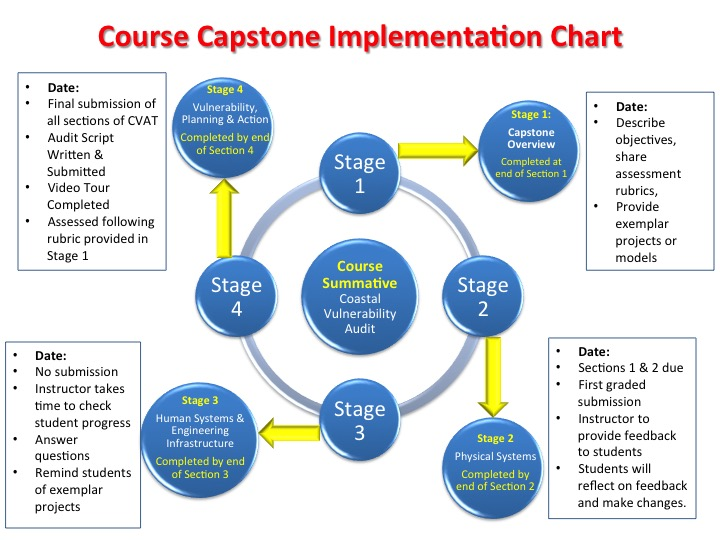
What is a capstone project?
A high school or middle school capstone project is a cumulative experience where the students are required to execute or design an impactful or significant project in the final year. During this project, the students are required to make use of their skills and knowledge acquired in different subjects and address real-world problems. Generally, a capstone project includes the following stages such as research, planning, iteration, and presentation. The project helps in showcasing the problem-solving, critical thinking, and communication skills, and creating a deep understanding of the subject matter and its practical usage.
The capstone project can take different forms such as a service or product prototype, an action research paper, a community service program, or any type of multimedia presentation, depending on the interests of the students, and educational contexts.

How do capstone projects help in improving learning?
The importance of capstone projects extends beyond academic requirements. The project provides an opportunity for the students to dive into their passion and take ownership of their educational experience. As the students make these projects they not only help in their personal all-round development, but also contribute to society. Capstone projects provide an opportunity for the students to learn for the sake of their learning with the research rooted in the field of their interest and all the skills learned during the years gain relevance. The capstone projects as a bridge between classroom learning and real-world situations and help the students demonstrate the readiness to start the next chapter in their life may be higher education or joining the workforce.
Role of Capstone project in improving the learning of the students
Capstone projects help transform the lives of the students. The major objective of the capstone project is to provide comprehensive learning to the students. They help in maturing a wide range of 21st-century skills that are more than just subject-specific knowledge.
- Application of the learning: Capstone projects help create a bridge between theory and practice They encourage the students to apply the knowledge they have learned in different subjects in real-life situations and improve their retention and understanding of the knowledge.
- Deepened Understanding: By involving specific topics of their interest, students gain a deeper knowledge of complex situations that the classroom setting may not address.
- Interdisciplinary learning: Capstone projects often require the high school to involve students from different disciplines to address multifaceted situations and challenges. This multidisciplinary approach helps create a holistic view of different problems and solutions.
- Research Skills: In capstone projects, students conduct research by collecting information from the literature review, collecting and analyzing data, and conducting interviews with key stakeholders fostering professional academic aims and goals.
- Critical thinking: The capstone requires the students to use critical thinking. The capstone is very complex and requires the students to make use of critical thinking. Students learn how to analyze information, asses perspectives, and take informed decisions.
- Problem-solving: Participating in capstone projects helps improve the students' problem-solving attitude. Students face different problems, experiment with new solutions, and adapt strategies as needed.
- Creativity: Capstone projects provide an opportunity for the students to explore innovative approaches and creative solutions, encourage imaginative thinking, and promote originality. Also, the students have the opportunity to work on creative projects such as performances and art installations.
- Communication: Capstone projects help improve the ability of the students to convey their ideas, thoughts, findings, and progress efficiently. Students get their skills refined in expressing complex concepts adapting to messages, better team collaboration, and delivering confident presentations.
Additionally, regular reflections help improve self-awareness and a better understanding of their journey.
How Capstone projects help the students in getting college Admissions
In today's competitive market, colleges require students to exhibit not only academic knowledge but also a commitment to growth and be ready to face new challenges in life. High school capstone projects help students to stand out from others.
Capstone projects enable the learners to showcase proof about themselves and how they worked on different projects. Regardless of GPA or SAT score, when the college can notice the ability of the students and their capabilities and what they care about it is more valuable than a simple narrative essay. When providing details in the college admissions, capstone projects highlight the dedication of the student, initiative, and ability to direct a long-term project to its completion. Admission officers understand that the capstone project demands commitment and resilience that is more than standardized training and highlights the potential of the students to gain success in college and the future.
Role of capstone project in making the students prepare after college
High capstone projects help in mirroring the demands of real life. Beginning from project planning to research to time management and efficient communication students learn and acquire practical skills that extend far beyond academics and classrooms. The collaborative nature of the capstone projects helps in improving the teamwork skill, interpersonal skills, that are essential in today's globalized world.
The capstone project also requires the students to work with the communities. The engagement of the students with the community helps in nurturing civic duties and a deep understanding of their work in society. As they face the real issues of society students learn the importance of empathy, ethical decision-making, the value of empathy, and cultural awareness.
Capstone helps in building confidence for learners by providing an opportunity to test out ideas in safe environments in school. Capstone projects help the students launch entrepreneurial ventures, lead campaigns, or start social justice initiatives, as they carry forward after graduation and their future careers.
How to implement a capstone project

Successful implementation of the Capstone project involves different crucial stages:
- Ideation: Capstone projects help explore their interests and identify topics that resonate with them. In addition, the projects also make the students evaluate the impact of the projects on the community. The phrase helps in encouraging curiosity and allowing the students to select the projects that hold their attention in the semester year.
- Research: To successfully implement a capstone project, guiding the students through the research proposed to select the topic is important. This is important as it helps create a strong foundation of understanding and knowledge and helps make the entire capstone journey.
- Project Planning and Management: Make the students learn about management skills that help the students in dividing projects into manageable works. Motivate the students to create semester, quarterly, and long-term plans depending on the duration of the project. This stage is significant as it helps in effective time management, and organization, to make steady progress in the project.
- Project documentation and implementation: This is the most significant stage in the capstone project. During this stage, the students are required to work actively on the project and translate the ideas into tangible outcomes. Simultaneously, they also reflect and document their progress, success, and challenges and make a comprehensive record to draw from their final presentation.
- Final showcase/Presentation: At this stage, the students are required to showcase their project to the audiences in a showcase event. This stage makes use of public speaking skills, and communication, and allows the leaders to evaluate their findings, insights, and the learning journey.
- Assessment and reflection: After the completion of the project it is important to reflect on the overall experience gained during the project. The process is very helpful in recognizing personal growth, skill development, and overcoming challenges. These reflections help in evaluating the overall effectiveness of the capstone project for the students.
Carefully undertaking these stages during the project helps in creating a meaningful and structured capstone experience that helps in skills development, self-confidence, and critical thinking ability in the students.
Tips for running a successful Capstone project
Some of the important tips for running successful projects are:
- Cultivate your skills before the senior years
It is important to start working on the capstone project by maturing the required skills before reaching the final year. Starting skill development in the initial stages helps the teachers make the students learn the capabilities and gain the confidence required to excel in cumulative projects.
- Implement weekly check-ins and clear progress tracking
It is important to implement weekly check-ins to keep track of the progress of the learner. Most of the students will be involving themes themselves in a long project for the first time to convert their ideas into realities. This transition is overwhelming and may create challenges for the students. To promote a smooth transition providing support and introducing project management is very much essential.
The use of weekly check-ins is very helpful in creating a valuable framework for the students to progress and provide them with timeless guidance.
- Embrace the skills, passions, and identities
One of the most important aspects of the capstone project is to align with the interests, background, and life experiences. Therefore creating a culture of openness and belief through the process of ideation and focus on vulnerability. Provide space for the learners to identify their interests, capacities, and skills and the problems they wish to solve in the real world. By focusing on these aspects, the overall value of capstone projects gets increased.
- Creating a Capstone Community
It is important to incorporate the important players in the college ecosystem in the capstone project to shape the program. This includes the collaboration of the college counselor, admission departments, and the advancement office to provide mentorship opportunities for the students. Moreover, it is also important to include the department heads such as Social Science and English, to make rubrics, and align the important components of the capstone experience. Incorporating the elements into the fabric of the existing course in schools helps in creating a connection between the new standard and the 12 standards.
It is also important to organize an exhibition during the capstone journey, this helps the stakeholders in the project be informed and involved in the capstone experience. Capstone projects help transform learning into a community-driven endeavor.


